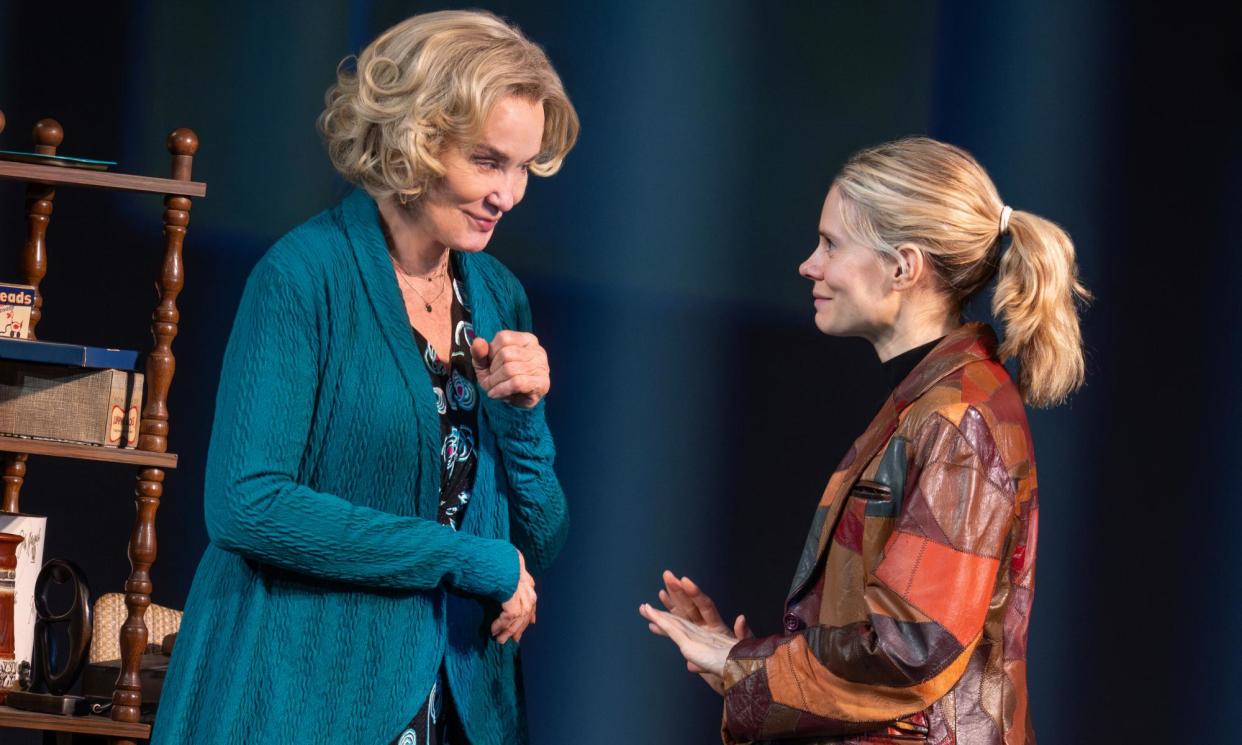Mother Play review – Jessica Lange anchors often aimless Broadway drama

At a performance of Pulitzer prize winner Paula Vogel’s late stage Tonys contender Mother Play, opening a day before eligibility ends, one can pick from three bright and syrupy themed cocktails before purchasing a tie-in cap graced with the word MOTHER screamed in pink. The play itself only has three characters, two of whom are queer with the third played by a martini-swigging Jessica Lange, a package that feels almost algorithmically designed to appeal to a gay audience.
Related: Mary Jane review – Rachel McAdams makes a magnetic Broadway debut
Even at a time of overwhelming competition on Broadway, there may well be enough check boxes ticked for some – Lange dancing to I Will Survive in a gay club definitely straddles a few – but Mother Play isn’t quite specific or emotionally searing enough to live beyond its admittedly alluring reference points. It works in moments, most of them the result of Lange’s ineffable presence, but as a whole, it’s not as commanding as her or its title demand, perhaps more estranged aunt than mother.
Vogel uses her own life as inspiration, as she did in her acclaimed 1992 play The Baltimore Waltz, both centering on siblings, both featuring a gay brother called Carl, a stand-in for her real brother of the same name who died of Aids in 1988. The story is presented as “a play in five evictions” as a mother called Phyllis (Lange) – Vogel’s mother was also called Phyllis – uproots her children from scuzzy apartment to scuzzy apartment in the wake of a messy divorce. Money is tight and tensions are high and her children, played by Jim Parsons and Celia Keenan-Bolger, are forced into positions of responsibility as they manage a mother who self-medicates with booze.
It’s a solid structural concept that allows for some slick and deftly justified maneuvering of furniture as the characters adjust to new apartments, the same pieces just slightly shifted by themselves. There’s also a smart use of overhead light as different fittings descend from a collection above, each time a slight upgrade in quality. The lived-in detail of the staging is mostly a win but director Tina Landau makes a few baffling missteps, the most jarring of which is a rather embarrassing sequence that sees giant cockroaches put on a synchronised dance routine, an intimate family drama suddenly turning into a deleted scene from Joe’s Apartment.
It’s an odd moment of confusion for those both on and off the stage, more of which emerge as the play progresses, the separation of evictions feeling more notable at the outset before they become almost forgotten and dramatically unimportant by the end. Time is loose and fuzzy, as it often is when we remember those early years, the play changing multiple decades without ever changing actor, a lofty task for its trio, some of whom are more able to convincingly age than others.
We meet the siblings when they’re young teens, a stretch for even the most skilled adult actor to pull off and one that Vogel herself has employed before in her Pulitzer winner How I Learned to Drive. In that play, Mary Louise-Parker was required to play 17 and here the ask is even younger, something that a confident Keenan-Bulger manages with ease, having perfected the art from playing Scout in Aaron Sorkin’s sterling 2018 adaptation of To Kill a Mockingbird. She manages to evoke awkwardness and impetuousness without falling into actors workshop parody, something that Parsons is notably less effective at throughout. The ex-Big Bang Theory star might have an accomplished career on stage but his 12 years on the CBS sitcom often leave him with an acting style that can still feel cartoonishly over-exaggerated, something that also plagued his leap to big screen leading man in 2022’s flat gay romance Spoiler Alert.
Like the show, he’s never able to rise to the bar set by Lange who might be playing a slightly remixed version of her greatest hits but well enough for it to feel like a show in itself. Even if an extended sequence of her making and eating a microwave dinner alone doesn’t have the pay-off it needs, or we deserve, spending so much uninterrupted time living with an actor of her calibre and dazzle is a rich reward. If we’d perhaps like to see Lange be pushed into something a bit further out of her wheelhouse then that’s a larger issue that one play is unable to fully address.
The inevitable descent into tragedy is sadly unmoving, the play working better when focusing on the smaller bittersweet notes of the day-to-day, the all-in-this-together intimacy of a family unit forced to strive and struggle under relatable constraints. There’s just not enough devastating detail in the crush of bad things happening to force us into feeling quite as curdled as we should, a polite clap at a point in the season when an ebullient cheer is needed. Mother Play sees a major writer teaming up with a major actor to give us a minor work.


